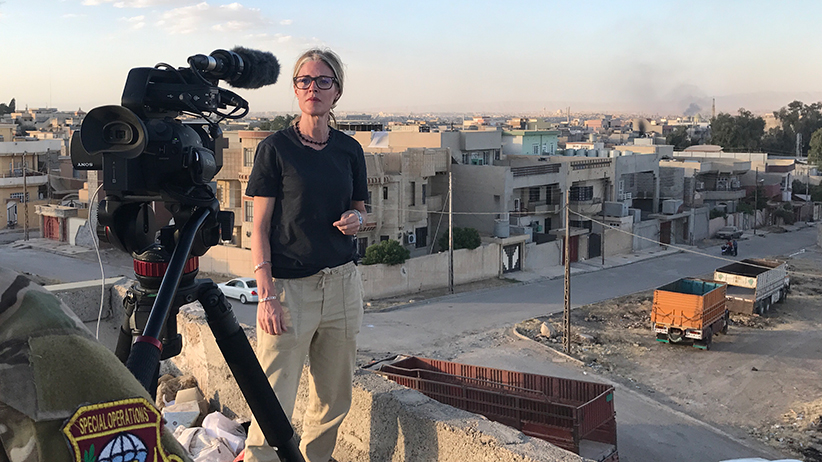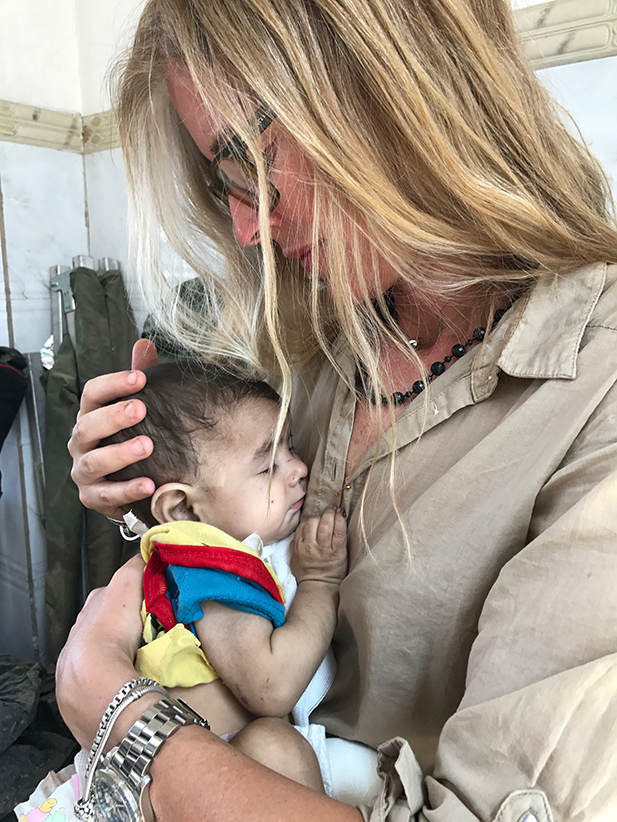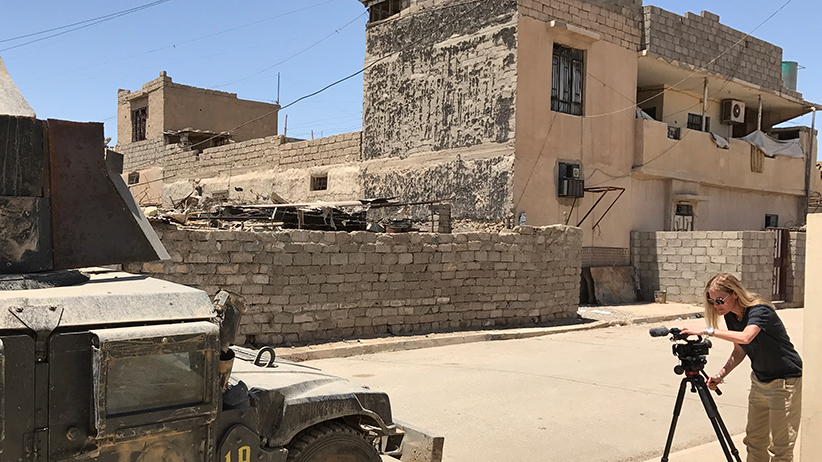What I learned about courage and heartbreak in Mosul
CityNews journalist Avery Haines spent two weeks volunteering at a medical clinic near the front lines in Mosul and reporting on the fight against ISIS
Avery Haines in Mosul (Avery Haines)
Share

For some reason I only cried twice in two weeks. Once was after trying to comfort a man whose leg had been crushed by an airstrike. I was holding up his mangled limb so a volunteer doctor could work on it. My other hand gripped his hand tightly, in the hopes it would distract him from his excruciating pain. In between moans, he pulled his hand away to show me a photo on his cellphone. I stared at that picture for so long and so hard; my brain simply could not register what my eyes were seeing: an elderly man lying in the middle of a dusty road. I think I remember crowds of people, not in a circle, but lining the street on either side of him. I know he was there all alone, lying on his stomach, his wrists bound behind his back. His ankles, too, were tied with the same dirty white bandages. He looked like a contortionist. How could he possibly get his head into that position? “My father, my father,” the man on the stretcher told me, stabbing at the picture with his finger. I took the phone from him and looked up close, still holding his bloodied leg with my other hand. His father’s head had been severed at the neck. It was placed in the middle of his back. His hair, flopped over his forehead, wasn’t long enough to hide an expression on his face that I remember seeing, but one I thankfully can’t recall. I was grateful, too, that I didn’t have the language to ask what ISIS “crime” his father had committed to deserve a public beheading.
The only other time I cried was earlier on that same day, when I sat in the home of a 35-year-old father of four, listening for hours to his story of what it was like to spend two years and eight months under ISIS occupation. Stories of women forced to be sex slaves, of eardrums being poked out with sticks as punishment for listening to music, of children being banned from playing with toys or anything with a face, of executions for having a SIM card, of living second by second in a hellish limbo between a death-like life and death itself.
I didn’t cry in front of either of these men but, when I was alone, wracking sobs escaped from a place in my heart that had been pierced only once before with the sudden death of my own father many years earlier.
RELATED: Read Avery Haines’s blog about her journey to Mosul at CityNews
I spent two weeks at the end of May living in an abandoned mosque in West Mosul, Iraq. It has been converted into a Trauma Stabilization Point by Iraqi military medics and a handful of International volunteers. We were just two kilometres from the front line in the final days of a massive, unprecedented offensive to end a three-year occupation by the most depraved terror organization on the planet. I saw their victims. I held them. I filmed them: the children shot in the back trying to flee with their families; the teen with a bullet between his eyes, an ISIS sniper’s victory shot; the starving babies; the skeletal mothers; the amputations; the soldiers with blown-off body parts.

I saw the victims of the punishing Coalition airstrikes as well. The family who told of seven missiles hitting their neighbour’s home, wiping out 28 extended-family members. The four tiny, dust-covered siblings, with crush injuries, who hauntingly screamed in unison “mama, mama, mama,” a sound so piercing I could almost see the words ricocheting off the mosque walls and ceilings and floors.
I went to west Mosul as a volunteer for an NGO called Global Response Management. I wrote up medical reports on the patients who were brought in from the front lines, usually by Humvee: their ages, their injuries, their status—red for critical, yellow for stable. We didn’t have many greens. I held malnourished babies while their mothers were being treated. I set up IV lines. I stroked hands. I gave love. And when I wasn’t doing that I was filming—nine hours of footage.
The mosque was, until a couple of months ago, an ISIS mosque. I slept in a small room on a mat, side-by-side with Iraqi Special Operations soldiers who fell asleep entwined with their assault rifles. It was hard to reconcile that this was the same space where Jihadists would gather to plot their depravity, an evil that is still being carried out on innocent civilians just two kilometres away. The rooftop remains littered with their cast-off clothing, ISIS propaganda, bedding and bullets.
READ MORE: What went wrong in Mosul
I also witnessed volunteer medics save the lives of suspected ISIS fighters. In one case, I hopped in the back of a beat-up ambulance with my camera, filming as we bounced through bombed-out streets. I’m still processing why I felt the need to press my foot against the gurney to protect him from being jostled by the bumpy drive. In retrospect, I take pleasure in knowing that his head was being cradled by a Jewish lesbian doctor, that the man getting him to the hospital was an ex-U.S. marine with the word “infidel” tattooed on his arm, and that a dual Canadian/American journalist was at his feet, filming the entire thing. If he was an ISIS fighter, this moment would surely have been his hell on Earth.
We went to sleep and woke to the constant sounds of war. Air strikes, mortar attacks, suicide bombs, artillery fire. It’s odd how noises so foreign can quickly morph into a normal soundtrack. Even sounds that I knew were too loud and had come too close triggered in me, at most, a minor flinch. One night on the rooftop, a bullet whizzed past me. I’m not an especially brave person, but I didn’t feel fear. I’m glad for that—my fear would have felt self-indulgent in the presence of so many who had been terrorized for so long yet were unable to pack up and return to Canada when it got to be too much.
It all sounds very heavy. And it was. But my two weeks were also filled with extreme joy and laughter. The warmth and love of the Iraqi people I met was breathtaking. People who have lived for generations under one war or another, but who still smile easily and possess a generosity I’ve never before experienced. I learned not to compliment a soldier’s belt, or a stranger’s watch. Before the words were even out of my mouth, they would try to stuff their belongings in my hands. Evenings, between patients, were spent sharing soldier’s rations and playing backgammon. They loved that I learned the Arabic word for “cheater,” which I would shout out when I caught them fiddling with the dice.
READ MORE: The terrifying last days of ISIS in Mosul
The family next door took pity on me for not being able to shower and invited me into their home to bathe, insisting I eat their food and drink their tea, even as they were abstaining during Ramadan. We played Frisbee on the mosque lawn with two little brothers who lived nearby and who were a constant presence in the lives of the soldiers and volunteers. Sometimes they would sneak into our room, snuggling in for a sleepover. These boys, soldiers and survivors were able to give love and receive it despite bearing witnesses to prolonged and profound acts of savagery.

I saw the best and I saw the very worst of what humans are capable of.
I’ve cried twice since I’ve been back in Canada. Once, while out for dinner alone on a patio: I was eavesdropping on a family at the table next to me and overheard English being translated. It wasn’t even Arabic. The tears sprung out of nowhere, and came out faster than I could wipe them away.
The second time I cried since leaving Iraq was after watching the final edit of , the one-hour documentary I’ve put together about the people I met. These were tears of relief, knowing that some of what I saw, and the stories I was told, you will see and hear, too. They were tears for a promise I had made, and tears for a promise I was able to keep. Youinis Ibdillaha, the father who survived two years and eight months under ISIS occupation begged me to share the story of what his people have been through: “Canada, the world, needs to know.” About ISIS and their perverted take on Islam, he says: “Lies, lies, lies. They are savages. They think they are ruling by the name of God but they [aren’t]. They are not Muslims. They are not Muslims.”
Avery Haines’ documentary Two Kilometres to Terror: Life and Death Under ISIS will air nationally on CityNews stations on Sun., July 9, at 10 p.m. EST.